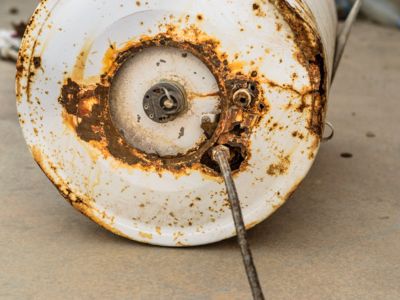Signs Water Heater Replacement Is Needed
The humble water heater is often taken for granted, silently working behind the scenes to provide families with hot water for their daily needs. However, like any other appliance, it's not immune to wear and tear. Water heater replacement is something that homeowners will have to do every so often, and it can be a shock to lose hot water as well as pay for water heater installation. Here is a quick guide to help owners decide when to replace a water heater so they don't waste precious years on their current unit.
Water Heater Woes: Corrosion Strikes

So, how can people detect tank corrosion? Keep an eye out for rusty-looking water or water with a metallic smell. If owners notice either of these signs, it's time to consider replacing the water heater. Delaying the replacement can lead to more extensive damage, increased energy bills, and even health risks due to contaminated water.
Hot Water, Where Art Thou?

Some of the signs that are a clear indication that the water heater is on its last legs are:
- Shower water is consistently cold or lukewarm
- Hot water runs out quicker than usual
- Hot water takes a longer time to arrive
When the water heater can no longer produce sufficient hot water, it's a sign that its heating elements or burners are failing. In some cases, repairing or replacing these components may be possible, but if the issue persists, investing in a new water heater is often more cost-effective.
The Aging Factor: When Repairs Become Too Frequent
Like all appliances, water heaters have a finite lifespan. Conventional tank-style water heaters typically last about 10 years while tankless models can last up to 20 years. However, usage patterns, water quality, and maintenance can significantly impact a water heater's lifespan.
If a water heater is approaching its golden years or has already surpassed its expected lifespan, keeping a close eye on its performance is essential. Frequent repairs or maintenance can indicate that the water heater is nearing the end of its service life.
In conclusion, corrosion, loss of hot water, and age or frequent repairs are all signs that a water heater is due for replacement. Ignoring these signs can lead to more significant problems, including water damage, energy inefficiency, and even health risks. Owners can avoid costly repairs and ensure a steady hot water supply for years by staying vigilant and recognizing these warning signs.
About Allens Plumbing
Allens Plumbing has the services every homeowner needs for water heater installation and maintenance. Their experts offer advanced solutions for all plumbing problems. Call today for same-day plumbing service in Aiea/Oahu, HI.
Distribution Links +
- lifestyle.kotaradio.com
- lifestyle.q923radio.com
- lifestyle.kynt1450.com
- lifestyle.all80sz1063.com
- lifestyle.myeaglecountry.com
- newsnetmedia.com
- atlanta.newsnetmedia.com
- augusta.newsnetmedia.com
- austin.newsnetmedia.com
- boise.newsnetmedia.com
- buffalo.newsnetmedia.com
- columbia.newsnetmedia.com
- columbus.newsnetmedia.com
- detroit.newsnetmedia.com
- fresno.newsnetmedia.com
- jacksonville.newsnetmedia.com
- losangeles.newsnetmedia.com
- minneapolis.newsnetmedia.com
- monterey.newsnetmedia.com
- myrtlebeach.newsnetmedia.com
- nashville.newsnetmedia.com
- norfolk.newsnetmedia.com
- odessa.newsnetmedia.com
- pittsburgh.newsnetmedia.com
- portland.newsnetmedia.com
- quincy.newsnetmedia.com
- sacramento.newsnetmedia.com
- saltlakecity.newsnetmedia.com
- sanantonio.newsnetmedia.com
- santabarbara.newsnetmedia.com
- siouxfalls.newsnetmedia.com
- waco.newsnetmedia.com
- sports.newsnetmedia.com
- lifestyle.roanokenewstalk.com
- lifestyle.995jamz.com
- https://smb.troymessenger.com
- https://smb.windsorweekly.com
- https://smb.clemmonscourier.net
- https://smb.gatescountyindex.com
- https://smb.harlandaily.com
- https://smb.irontontribune.com
- https://smb.ourdavie.com
- https://smb.state-journal.com
- https://smb.thecharlottegazette.com
- https://smb.thecoastlandtimes.com
- https://smb.theinteriorjournal.com
- https://smb.thetidewaternews.com
- https://smb.tryondailybulletin.com
- https://smb.winchestersun.com
- https://smb.farmvilleherald.com
- https://smb.salisburypost.com
- https://smb.shelbycountyreporter.com
- https://smb.smithfieldtimes.com
- https://smb.suffolknewsherald.com
- https://smb.thewashingtondailynews.com
- https://smb.thewetumpkaherald.com
- https://smb.cordeledispatch.com
- https://smb.lagrangenews.com
- https://smb.middlesboronews.com
- https://smb.roanoke-chowannewsherald.com
- https://smb.tallasseetribune.com
- https://smb.thepostsearchlight.com
- https://smb.valleytimes-news.com
- https://smb.lowndessignal.com

